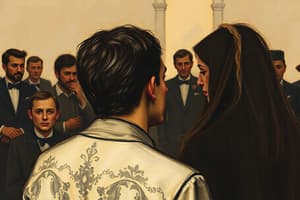Podcast
Questions and Answers
What aspect of self-concept refers to how one perceives him or herself?
What aspect of self-concept refers to how one perceives him or herself?
- Self-image (correct)
- True self
- Ideal self
- Self-worth
Which self is described as the core of who you are, unshaped by societal influence?
Which self is described as the core of who you are, unshaped by societal influence?
- False self
- True self (correct)
- Social mask
- Ideal self
What is the role of the 'false self' in psychological terms?
What is the role of the 'false self' in psychological terms?
- To adapt and fit in with societal expectations (correct)
- To represent the actual beliefs and values of the individual
- To enhance self-esteem and self-worth
- To achieve personal goals and dreams
Which of the following best describes the 'categorical self'?
Which of the following best describes the 'categorical self'?
What does the ideal self represent in self-concept?
What does the ideal self represent in self-concept?
In the context of cognitive construction, what is emphasized?
In the context of cognitive construction, what is emphasized?
Which term refers to the social roles created to interact effectively with a broader range of people?
Which term refers to the social roles created to interact effectively with a broader range of people?
Which component of the self-concept is likely to change most frequently?
Which component of the self-concept is likely to change most frequently?
What is a key statement related to the false self?
What is a key statement related to the false self?
What does the statement 'the curious paradox is that when I accept myself just as I am, then I can change' imply about personal growth?
What does the statement 'the curious paradox is that when I accept myself just as I am, then I can change' imply about personal growth?
What does the concept of self-preservation primarily involve?
What does the concept of self-preservation primarily involve?
How does William James characterize the I self?
How does William James characterize the I self?
What does congruence between the real self and ideal self imply?
What does congruence between the real self and ideal self imply?
Which component forms part of the material self according to the constituents of self?
Which component forms part of the material self according to the constituents of self?
What characterizes the social self?
What characterizes the social self?
What is an essential aspect of Carl Rogers's self theory?
What is an essential aspect of Carl Rogers's self theory?
How is self-feeling defined?
How is self-feeling defined?
What aspect does the pure ego represent in the constituents of self?
What aspect does the pure ego represent in the constituents of self?
Which statement best describes the process of self-reflection as it relates to the Me self?
Which statement best describes the process of self-reflection as it relates to the Me self?
What does the dynamic nature of the ideal self suggest?
What does the dynamic nature of the ideal self suggest?
Which of the following best illustrates the action of self-seeking?
Which of the following best illustrates the action of self-seeking?
In what way does self-awareness enhance emotional regulation?
In what way does self-awareness enhance emotional regulation?
What is one role of self-identity in personal development?
What is one role of self-identity in personal development?
How can observing one's emotions help in personal development?
How can observing one's emotions help in personal development?
What does observational learning refer to in Albert Bandura's theories?
What does observational learning refer to in Albert Bandura's theories?
Which component of human agency refers to the way individuals form intentions with action plans?
Which component of human agency refers to the way individuals form intentions with action plans?
What can most negatively impact the process of retention in observational learning?
What can most negatively impact the process of retention in observational learning?
Which of the following best describes self-efficacy as mentioned in Bandura's theory?
Which of the following best describes self-efficacy as mentioned in Bandura's theory?
What is necessary for an individual to develop muscle memory according to the process of motor reproduction?
What is necessary for an individual to develop muscle memory according to the process of motor reproduction?
What is one of the four core properties of human agency highlighted in Bandura's theories?
What is one of the four core properties of human agency highlighted in Bandura's theories?
What role does motivation play in Albert Bandura's observational learning model?
What role does motivation play in Albert Bandura's observational learning model?
Which aspect of attention is crucial for successful observational learning?
Which aspect of attention is crucial for successful observational learning?
In Bandura's model, what does self-reactiveness signify?
In Bandura's model, what does self-reactiveness signify?
How does Bandura's theory view the relationship between humans and their life circumstances?
How does Bandura's theory view the relationship between humans and their life circumstances?
Why is the concept of retention important in the context of observational learning?
Why is the concept of retention important in the context of observational learning?
What implication does Bandura's emphasis on self-efficacy have for education and learning?
What implication does Bandura's emphasis on self-efficacy have for education and learning?
Which factor can negatively affect attention during the learning process as per Bandura's model?
Which factor can negatively affect attention during the learning process as per Bandura's model?
In the context of Bandura’s theories, how do incentives or punishments influence learning?
In the context of Bandura’s theories, how do incentives or punishments influence learning?
Flashcards
Categorical Self
Categorical Self
The stage in childhood development when a child recognizes their existence as separate from others and begins to categorize themselves by attributes like age, sex, etc.
Self-worth/Self-esteem
Self-worth/Self-esteem
An aspect of self-concept, representing a person's evaluation of their own worth.
Self-image
Self-image
How a person perceives themselves; a component of self-concept.
Ideal Self
Ideal Self
Signup and view all the flashcards
True Self
True Self
Signup and view all the flashcards
False Self
False Self
Signup and view all the flashcards
Unified Selves
Unified Selves
Signup and view all the flashcards
Multiple Selves
Multiple Selves
Signup and view all the flashcards
Social Mask
Social Mask
Signup and view all the flashcards
Global vs. Differentiated Models
Global vs. Differentiated Models
Signup and view all the flashcards
I-Self
I-Self
Signup and view all the flashcards
Me-Self
Me-Self
Signup and view all the flashcards
Material Self
Material Self
Signup and view all the flashcards
Social Self
Social Self
Signup and view all the flashcards
Spiritual Self
Spiritual Self
Signup and view all the flashcards
Congruence
Congruence
Signup and view all the flashcards
Self-seeking
Self-seeking
Signup and view all the flashcards
Self-preservation
Self-preservation
Signup and view all the flashcards
Empirical Self
Empirical Self
Signup and view all the flashcards
Self-feelings
Self-feelings
Signup and view all the flashcards
Self-Theory (Rogers)
Self-Theory (Rogers)
Signup and view all the flashcards
William James
William James
Signup and view all the flashcards
Carl Rogers
Carl Rogers
Signup and view all the flashcards
Global Models of Self
Global Models of Self
Signup and view all the flashcards
Gestalt Psychology
Gestalt Psychology
Signup and view all the flashcards
Humanistic Psychology
Humanistic Psychology
Signup and view all the flashcards
Differentiated Models of Self
Differentiated Models of Self
Signup and view all the flashcards
Sigmund Freud
Sigmund Freud
Signup and view all the flashcards
Id
Id
Signup and view all the flashcards
Ego
Ego
Signup and view all the flashcards
Superego
Superego
Signup and view all the flashcards
Personal Unconscious
Personal Unconscious
Signup and view all the flashcards
Collective Unconscious
Collective Unconscious
Signup and view all the flashcards
Archetypes
Archetypes
Signup and view all the flashcards
Agentic Theory
Agentic Theory
Signup and view all the flashcards
Observational Learning
Observational Learning
Signup and view all the flashcards
Western Self
Western Self
Signup and view all the flashcards
Eastern Self
Eastern Self
Signup and view all the flashcards
Study Notes
The Self in Psychological Perspective
- William James' concept of "I" and "Me" selves
- The "I" self is the thinking subject, conscious of its environment and existence.
- The "Me" self is the object of its own thinking, how others perceive it.
- The self is comprised of the empirical self (possessions, relationships, beliefs) and self-feelings (resulting emotions).
- The self seeks self-preservation and self-improvement.
- Carl Rogers' theory of self-development (gradually developed during childhood).
- Emphasizes the difference between the real self and the ideal self.
- Real self refers to one's actual characteristics.
- Ideal self refers to one's desired characteristics.
- Congruence is important for high self-worth; when the real and ideal self are similar.
Aspects of Self-Concept
- Existential self: individual begins to recognize their existence, separate from others.
- Categorical self: individuals categorize themselves based on age, sex, etc.
Thoughts Supporting Global Models
- Gestalt Psychology - The whole is greater than the sum of its parts.
- Humanistic Psychology - Human beings supersede the sum of their parts
Differentiated Models
- Look into human components, understanding their uniqueness.
Albert Bandura's Agentic Theory
- Rejects the idea of the self being culturally influenced.
- Humans have the ability to think, decide, foresee, and control their actions.
- Self is a proactive and agentic part.
The Self in Western and Eastern Thoughts
- Individualism (self-oriented): emphasizes independence, personal needs, and self-reliance.
- Collectivism (group-oriented): prioritizes group loyalty, belongingness, and group needs.
Western Self as Analytic
- Focuses on causal links, part-to-whole relationships.
- Emphasizes connections.
Western Self as Monotheistic
- Belief in one Supreme Being coexisting with the universe.
Western Self as Individualistic
- Emphasizes coexistence of good and bad in freedom.
- Prioritizes personal desires over group needs.
Buddhism
- Emphasizes no permanent self (Anatta).
- Suffering stems from craving and attachment.
- Liberation achieved through the Eightfold Path.
Confucianism
- Self-cultivation prioritizes the benefit of others.
- The individual is part of a larger whole.
Taoism
- Harmony with the Tao (the way).
- Taoism emphasizes living in harmony with the universe.
Material Aspect
- Material possessions shape the self.
- The body, possessions and family play a major role in personal perception.
Consumerism and One’s Self-Identity
- Consumer culture and credit cards change how people buy goods and services.
- Material possessions can influence happiness and relationships positively or negatively.
The Self in Sexual and Reproductive Behavior
- Highlights the diversity of human sexual behaviors.
- Describes various types of sexual acts.
- Explains sexually transmitted diseases.
- Includes contraception methods.
- Discusses issues of reproduction and sterilization.
Physiological Aspects of Self
- Body image refers to feelings about the body.
- Self-esteem determines an individual's total value.
- Psychological impact of beauty perceptions.
Studying That Suits You
Use AI to generate personalized quizzes and flashcards to suit your learning preferences.




